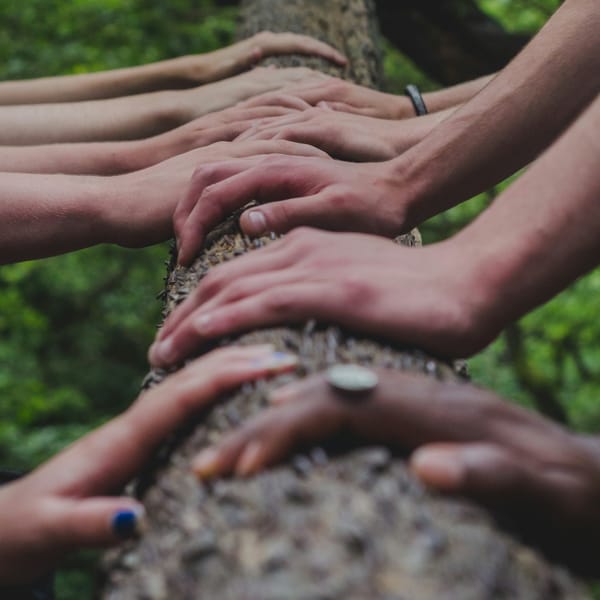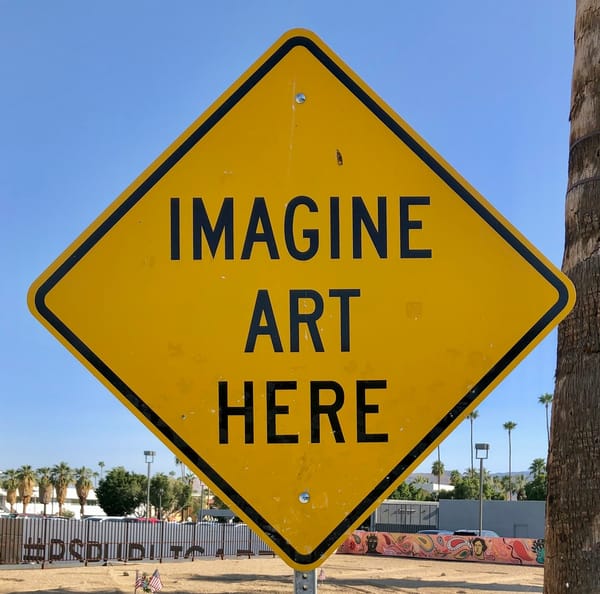Re-Imagining How We Live Together in the Age of AI
The question isn’t what AI will do to us, but what we’ll do with it.

We are living through a quiet revolution, one that hums inside the walls of our homes and pockets, one that is invisible yet everywhere. Artificial intelligence, once the dream of philosophers and futurists, is now shaping the texture of daily life. It composes our playlists, finishes our sentences, and decides who gets a loan or a job. It is learning from us faster than we are learning from it.
And so, we find ourselves at a threshold moment: the line between what we make and what makes us is beginning to blur. The tools we’ve built to extend our capacities may now be rewriting the coordinates of what it means to be human together.
The question is not whether AI will change the world. It already has. The question is whether we can change ourselves, and our ways of working, living, playing, and sharing abundance, so that this technology amplifies what is most humane in us, rather than what is most efficient.
The Promise: An Expansion of Possibility
For centuries, work has been the engine around which society revolved -- defining our worth, our time, our identities. But perhaps for the first time in history, automation may liberate us from drudgery. What might we do with the hours no longer bound to the assembly line, the spreadsheet, the late-night inbox?
AI could become a collaborator in creativity, not a competitor. It could free the nurse to spend more time with the patient instead of the paperwork; it could give the teacher more moments of listening, less of grading. It could turn data into dialogue, and help us notice patterns of suffering and possibility we might otherwise ignore.
In how we live, AI might guide us toward systems that finally make sense -- cities that breathe with the rhythm of the people within them, homes that waste less and care more, infrastructures that balance human comfort with planetary limits.
And in play, the purest form of learning, it could open new forms of collective imagination. Already, artists and programmers are co-creating with algorithms, discovering new colors, new languages, new ways to dream. Perhaps our future poets will be half-human, half-machine; our future games will be conversations rather than competitions.
When used with care, AI could become the greatest democratizer of all, sharing knowledge, wealth, and opportunity across boundaries that once seemed fixed. It could teach us to distribute abundance rather than hoard it.
But only if we choose.
The Peril: The Shadow Side of Convenience
Every new power reveals its shadow. For all its promise, AI mirrors the biases, inequalities, and blind spots of its creators. If we are not careful, it could harden the very hierarchies it was meant to soften.
Already, a handful of companies command vast oceans of data -- the raw material of this new economy. Their algorithms decide who is seen and who remains invisible. Privacy becomes a currency few can afford. The language of optimization often leaves out the language of care.
Meanwhile, the human heart grows restless. We are surrounded by connection, yet starving for communion. In a world of infinite personalization, it becomes harder to find what is shared. When machines anticipate our desires, they may also narrow them, creating comfort without curiosity.
And even as AI promises a greener planet, it consumes enormous amounts of energy -- training vast models that draw from power grids already under strain. The cloud, we are reminded, is still made of metal and heat.
The deeper danger, though, lies in what we stop imagining for ourselves. When we outsource decision-making, empathy, and creativity, we risk forgetting the slow, uncertain art of being human.
The Adaptation: Learning to Live Differently
To live well with AI will demand more than new policies or codes of ethics; it will require a re-imagining of our values.
We will have to rethink work, not as a means of survival, but as an expression of purpose. If the machines take over routine labor, what remains will be the deeply human tasks: caring for one another, tending to the land, imagining what doesn’t yet exist. The challenge will not be job scarcity, but meaning scarcity.
We will have to rethink living, designing communities that are both technologically advanced and profoundly humane. Cities that use sensors to conserve energy might also use them to listen – tracking loneliness, not just traffic.
We will have to rethink play, treating it not as distraction but as renewal. Play is how we remember our creative essence, how we learn to trust each other again. In the hands of AI, play can become a global language, bridging differences instead of amplifying them.
And most of all, we must rethink abundance. The wealth created by AI cannot belong to a few; it must circulate through the whole ecosystem of society. The question of ownership (of data, of algorithms, of labor) will determine whether AI ushers in a renaissance or a new feudalism.
If the twentieth century was about production, perhaps the twenty-first will be about distribution: of power, of care, of voice.
What We Must Rethink Soonest
There are certain things we cannot postpone. Governance must evolve faster than the technology it seeks to guide. Education must expand beyond coding to include empathy, ethics, and philosophy – teaching not just how AI works, but what it should work for.
Economics must pivot from extraction to regeneration, measuring prosperity not in GDP but in wellbeing. And our culture must reclaim the slow virtues, like listening, patience, and humility, that no machine can replicate.
We will need new rituals to remind us of what cannot be automated: the taste of shared meals, the warmth of a friend’s laughter, the mystery of silence. These are the data points that make a life.
The Human Choice
AI will not decide what kind of world we build; we will. The algorithms may be complex, but the choice is simple. Do we use this technology to widen empathy or to tighten control? To share abundance or to concentrate it? To connect or to consume?
The future is not something happening to us; it is something we are composing, line by line, with the tools we hold.
If we can remember that the ultimate intelligence is not artificial but emotional (the intelligence of compassion, of attention) then perhaps we can turn this turning point into a beginning.
AI is not the story of machines learning to be human. It is the story of humans learning, again, what it means to be humane.



